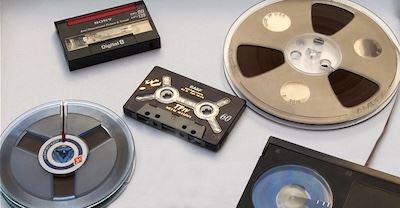 We all know that technology changes swiftly. However, a short article this week surprised me. It appears that US government agencies are being pushed to stop recording meetings, talking books, and other archival documents on audiotape. The answer is simple: they (the US government agencies) can no longer purchase recording tapes!
We all know that technology changes swiftly. However, a short article this week surprised me. It appears that US government agencies are being pushed to stop recording meetings, talking books, and other archival documents on audiotape. The answer is simple: they (the US government agencies) can no longer purchase recording tapes!
Quantegy, one of the last analog tape suppliers in the United States, filed for Chapter 11 bankruptcy protection and shut down its lone U.S. operation. Quantegy was the principal tape provider to federal agencies, but that supply line is now in peril. Agencies must either upgrade, which is a costly and risky process of transitioning to digital storage media, or look elsewhere for high-quality analog tapes.
In January 2005, having previously filed for bankruptcy protection, Quantegy closed its manufacturing facility. In April, 2005, Quantegy resumed operations under new ownership. In January 2007, Quantegy’s new owners announced that it will cease production of magnetic tape in April 2007
The National Archives and Records Administration has already switched from Quantegy tape to WAV files preserved on digital medium such as CDs. "Audiotapes are not becoming old-fashioned," said Les Waffen, an audiovisual archivist in NARA's special media branch. "They're just not going to be available anymore."
NARA officials have begun archiving audio recordings, such as the CIA's radio monitoring of POWs and MIAs during the Vietnam War and oral arguments before the Supreme Court, in digital and WAV files. NARA officials now are unabl;e to purchase new tapes..
Gene DeAnna, the acting chief of the Library of Congress' recorded sound section, appears delighted with the development. "The largest use of audiotapes has been to reformat fragile sound recordings to tape," DeAnna stated in a statement. "We are not using audiotapes to reformat anymore, and it's a good thing."
Library officials have since purchased nine digital audio workstations for producing WAV files for less than $10,000 each.
DeAnna emphasized that digital offers more resolution than cassette. The library continues to use and acquire audiotapes when sources can be located, but they are then stored in deteriorating boxes. According to DeAnna, Quantegy used to provide archival containers, but library authorities now have to search elsewhere.
Are you still recording on audio tapes? If so, I might suggest it is time to look for more modern technologies. Perhaps it is also time to transfer your existing tapes to more modern methods.